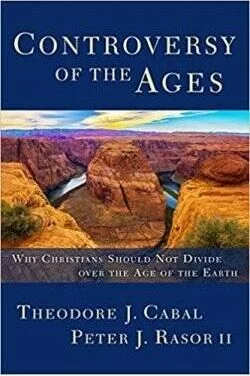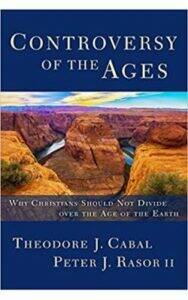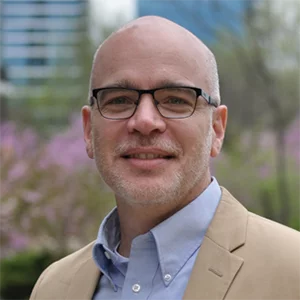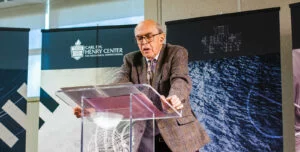I’m thankful for the opportunity to participate in this series about the Cabal and Rasor book, Controversy of the Ages.I’ll refer to Cabal as the author from here on.
I agreed to the assignment having had no previous knowledge of the book. But I had met Ted Cabal at one of the private meetings with BioLogos, Reasons to Believe, and Southern Baptist seminary professors (that led to the joint book, Old Earth or Evolutionary Creation? for which Ted served as one of the moderators). I enjoyed his sense of humor and respected the way he handled himself in discussing potentially divisive topics. So when I saw the subtitle of his book (Why Christians Should not Divide over the Age of the Earth) I assumed I’d be able to chime in with his conciliatory approach and recommend adopting the same attitude toward other scientific topics the church is wrestling with. I was surprised, then, when I realized I’d fallen victim to judging the book by its cover! There would have been more truth in advertising if the subtitle were extended to include: But Why They Should Divide Over Evolution.
I was surprised, then, when I realized I’d fallen victim to judging the book by its cover! There would have been more truth in advertising if the subtitle were extended to include: But Why They Should Divide Over Evolution.
The organization I work for—BioLogos—was specifically discussed in the book alongside other Christian origins organizations. Cabal concludes his treatment of BioLogos with: “I could never recommend BioLogos as a constructive resource for the church” and “I could not in good conscience support pastors, seminary professors, or denominational leaders with similar biblical understandings” (p. 217).
Those are strong statements! They are tempered by his acknowledgement that many at BioLogos are thoughtful, respectful, “delightful Christians,” and “biblically serious” (pp. 190-191). Yet his strong conclusion is in need of a response, and I’m grateful for the opportunity to do so here on behalf of BioLogos.
First, I want to acknowledge that the book is an engaging read that will resonate with many American Evangelicals and their intuitions about the origins debate. Cabal has deftly staked out a middle ground between the extremes of the hard line, rancorous young earth creationists he describes on the one hand, and the permissive and liberal Darwinians on the other. The problem with those to the right of him, according to Cabal, is not their position as much as the tenacity with which they hold it. They are still legitimate conversation partners, just urged to be more kind and flexible about their views. In contrast, Cabal has judged that BioLogos and others to the left of him, however kind and respectful he thinks we are (p. 217), do not explicitly affirm the doctrine of inerrancy, and so we are left out of Christian fellowship.
To be clear, it is not our salvation itself that is being questioned. This is a “level two” doctrine according to Cabal’s application of theological triage; that means only that we cannot remain in close fellowship (p. 189) or do church together (p. 210). I find this sad, because it is primarily in that context we might actually come to understand each other better. In our experience, it is by spending time together that helps us get past misunderstandings and mischaracterizations. I wish Ted might have spent a couple more weekends with us before his book was written. Eating, praying, and worshiping together have a way of sorting out disagreements among believers much more effectively than do blog posts. But here we are.
Cabal said he hopes what he has written in the book might serve as “starting points for more fruitful conversations” (p. 190). It is not clear that he means fruitful conversation with people like us, since we’ve been deemed outside the bounds of acceptable fellowship. But in the spirit of hoping for that, I’ll reply to the book by suggesting two ways for moving ahead with a more fruitful conversation with BioLogos: 1) represent us accurately and charitably; and 2) engage the science of evolution to the level that you did the science of the age of the earth.
Represent Us Accurately and Charitably
Cabal claims: “BioLogos makes no commitment to full scriptural inspiration, thus it does not practice the conservatism principle” (p. 213). That is not accurate. The first statement in our What We Believe section says, “We believe the Bible is the inspired and authoritative word of God.” All staff, board members, and speakers are required to affirm this.
I suspect, though, that what Cabal means by “full scriptural inspiration” is the doctrine of inerrancy as articulated by the Chicago Statement on Biblical Inerrancy. In that case, it is true that we do not listWe believe God intentionally created human beings in his image, and that God has a purpose and plan for his creation that will not fail to be accomplished. commitment to it as one of our belief statements. There are some affiliated with us who do accept it, and others who don’t find the terminology helpful.
Cabal seems particularly troubled by the fact that he found a 2010 article on our website titled “After Inerrancy.” It’s not true that the article is “prominently featured” (p. 181) or that we “recommend” (p. 216) that article as he claimed, but it is true that the article was there (though since the writing of the book it was removed, for a number of reasons). Authors for our blog are not required to affirm our belief statements. We have tried to make our website a place for gracious dialogue about science and Christian faith. We have hosted hundreds of writers from lots of different backgrounds, including young earth creationists and atheists. So the mere fact that someone appears on our website does not in itself constitute an organizational endorsement of what they say, merely that we find them worthwhile conversation partners. Cabal’s concern seems to be: this liberal article is on their website, and therefore they are willing to be in dialogue with such views; and even being willing to dialogue with such views means they have gone too far. That’s perhaps stated more crassly than Cabal would want to say it. He says, “The problem is the group’s openness to an array of problematic ideas that it thereby recommends the church should consider adopting” (p. 191). It is uncharitable to jump from “there is an article on the BioLogos website” to “BioLogos recommends the church should consider adopting that view.”
Another prominent instance of misleading representation of BioLogos has to do with the term “Darwinism.” Cabal defines the term by citing what Charles Hodge had to say about it in the 1870s, which is “most important[ly], the rejection of purpose or design” (p. 82). Cabal claims, “most at BioLogos” are “traditional anti-teleology Darwinians” (p. 96, fn. 103). And then in attempting to distance B. B. Warfield from the likes of us, Cabal says,
As opposed to Darwinism, Warfield believed not only must God have created the original “stuff,” but he must also have been involved in each stage of development. Theories that speak of evolution as God’s method of mediate creation but reject God’s providential guidance of the development cannot properly be called creation (p. 194).
I don’t know one person at BioLogos (and I think I know them all) who rejects God’s providential guidance of creation. We believe God intentionally created human beings in his image, and that God has a purpose and plan for his creation that will not fail to be accomplished. Who in our organization could be accurately and charitably called a “traditional anti-teleology Darwinian”?
Engage the Science
The second main point I’d like to make is that there is a vast disparity in Controversy of the Ages between how the sciences of the age of the earth and of evolution are treated. Cabal structures his arguments around what he calls the Theological Conservatism Principle (p. 40). According to this principle, Interpretive Step 1 is: “traditional biblical interpretations govern unproven science” (p. 45); and Interpretive Step 2 is: “proven scientific theory requires biblical reinterpretation” (p. 46). Cabal develops these from the standard test case of Galileo and heliocentrism, and then he does a nice job of walking through the transition from Step 1 to Step 2 in the case of the age of the earth. He accurately rehearses the multiple lines of evidence scientists have uncovered which testify to an ancient earth.
But when he applies the Conservatism Principle to evolution (or more specifically to the theory of common descent), there is hardly a mention of any science undergirding the theory. Once he has admitted that interpretations of Scripture are not inerrant, But when he applies the Conservatism Principle to evolution (or more specifically to the theory of common descent), there is hardly a mention of any science undergirding the theory.the key to whether we can consider integrating a current scientific theory with our understanding of Scripture is whether or not the science is “proven.” So don’t we need some investigation into the status of evolutionary science?
The obvious place where this might happen is in Chapter 9 when Cabal starts to report on why BioLogos holds to the things we do. He says, “In defense of [their claim that universal common descent should be entertained] BioLogos notes that evangelicals have embraced universal common descent in the past without becoming theological liberals or worse. Their primary example is B.B. Warfield” (p. 191).
Yes, we point to Warfield occasionally as an example of someone committed to inerrancy (he was one of the chief modern articulators of the doctrine) who didn’t find it in obvious conflict with the theory of evolution. But we don’t cite him in defense of the science. Cabal goes on to spend six pages explaining why Warfield was not a Darwinian (neither are we, as explained above), and why he was the one who truly followed the Conservatism Principle on this issue. OK, but remember Warfield was writing about this over 100 years ago. There has been a lot of scientific evidence that has amassed since then.
Cabal holds up Galileo as the developer of the Conservatism Principle, yet notes that he didn’t adhere to it consistently, since he “violated one of his own principles by arguing for reinterpreting Scripture before heliocentrism had actually been proven… The majority of qualified astronomers were not yet Copernicans” (pp. 46-47). This isn’t remotely the situation we’re in today with respect to evolution, where 99% of practicing professionals in biology and medicine accept evolution as the scientific explanation for the origin of human beings.Pew Research Center, An Elaboration of AAAS Scientists’ Views If science is relevant to the question of how to interpret Scripture, shouldn’t we at least listen to what the scientists have to say? Of course, truth is not decided by a majority vote, but in what other realm of human inquiry would lay people so confidently disregard what 99% of the professionals have concluded?
One of the common replies to this line of argument is that science is always changing. That claim is vastly overstated. Scientists really do figure things out about the natural world that become settled knowledge claims. Is there any chance of future scientists changing their minds about heliocentrism or germ theory? 99% of practicing professionals in biology and medicine accept evolution as the scientific explanation for the origin of human beings.The theory of common descent has achieved that kind of status in the scientific community. There are lots of little details to be worked out (over which scientists disagree), but the central aspects of the theory are established beyond scientists’ reasonable doubt.
But even if evolutionary theory is completely overthrown in some distant future, an argument might be made that that would be of little concern to us now. This is our time and we’re accountable for articulating the Gospel in the context in which we’ve been placed. God’s people through the ages have been in conversation with the culture around them. Think of the Genesis creation accounts with respect to the ancient Near East; Paul’s message at the Areopagus; the Cappadocian Fathers and the Greek terminology they employed to articulate theology; or Aquinas and the rediscovery of Aristotle. In none of these instances were the intellectual norms of the culture accepted uncritically, but they were important parts of the conversation.
It is not the primary goal of BioLogos to persuade everyone that evolution is true. Rather, it is our primary goal that evolutionary creation be seen as a legitimate and faithful option for evangelical Christians, and as such should be part of the evangelical dialogue on science and faith. If Cabal’s book is any indication of the state of the dialogue, we still have work to do.








Comments
Be the first one to make a comment!